

The Richmond Rent Program is facing a $277,698 deficit due to a growing number of delinquent rental unit fees and overhead charges levied by the City of Richmond.
While rental housing fee collection has increased overall since 2017, collecting it in the last two fiscal years has become more challenging. There are now 2,900 rental units with outstanding fees and a growing backlog of 147 late fee waiver requests, according to a report presented at the Rent Board meeting on May 7.
During the meeting, Richmond Rent Board member Elaine Dockens said, “It sounds like we are in a pickle,” and questioned why she was just learning about the deficit.
“A quarter million dollar deficit. The thing that concerns me, being a boardmember, is why didn’t we notice that we were declining?” Dockens asked during the meeting.
“For the future, I want to hear about this. The fact that it’s the fourth quarter right now, and I’m just hearing about this. Like I said, I’m astounded,” Dockens said. “I can’t think on the spur of the moment, and that $277,000 has got my head wheeling.”
Richmond Rent Program Executive Director Nicolas Traylor said fees paid by landlords fund the program, and its collection rate is impacted when landlords stop paying or fail to pay on time.
“From conversations I’ve had with billing and registration staff, a lot of those landlords are saying they’re trying to just delay as much as possible, and some are seeing if they can get away with not paying it at all.”
The Rent Program was established after voters passed The Richmond Fair Rent, Just Cause for Eviction, and Homeowner Protection Ordinance in 2016. The program regulates landlord and tenant matters relating to rent and evictions in the city.
According to an agenda report, after the April meeting, staff reviewed the actual revenue and expenditures and projected a probable deficit based on how quickly the program is spending its cash and revenue yet to be collected.
“Staff are ramping up collection efforts for the last two months of the fiscal year to avoid a possible deficit,” Traylor said. “It is, however, more likely than not that the rent program will end the fiscal year with a $277,698 deficit.”
Considering the program’s current financial situation, Traylor said it may take some time to increase its collection rate.
A monthly revenue and expenditure report for the rent program lists an adopted budget of $3,074,698 in revenue, mostly from rental housing fees and total expenditures of $3,476,253.
Grandview made multiple unsuccessful attempts to obtain updated information from Rent Program staff. Employees would not share basic information like the number of rental units enrolled in the program or the number of units out of compliance with the ordinance.
According to a 2023 Budget and Rental Housing Fee Study, 7,717 units were fully covered by the rent control ordinance. Another 10,385 units were listed as partially covered or protected by the just cause eviction.
The rent board had previously pushed to increase outreach efforts, including attending events and mailings to landlords and tenants. Traylor said adding new positions or increasing spending is a concern and may lead to mounting deficits.
“If the board decides to add any new staff resources, those resources should focus on increasing the collection rate of the rental housing fee and addressing the significant rise in rent adjustment petitions filed,” Traylor said.
If the staff’s recent efforts to boost revenue collection during the final two months of the fiscal year are successful, the budget deficit may not materialize despite projections.
The Rent Program risks losing autonomy if it is unable to collect rental housing fees and has to ask the city for money.
“If we receive loans from the city. The city has more control, more leverage over the program,” Traylor said. “They can pretty much tell us to do X, Y, and Z and a lot more.”
Another factor contributing to the projected deficit is the overhead cost that the city bills to the Rent Program. These fees, called “cost pool allocation,” cover general liability, administrative charges, and space at Richmond City Hall for the Rent Program.
The 2023 fee study includes $60,248 for the civic center allocation but no money for general liability, workers' compensation, and administrative charges.
2023 Budget and Rental Housing Fee Study

The total cost pool amount listed in the most recent Rent Program expenditure report is $330,473, which includes $217,744 in general liability, $52,481 in administration charges, and $60,248 for space at city hall for the Rent Program.
Rent Program and city staff are reportedly negotiating a possible waiver of future cost pool charges to incentivize collaboration between the city and the rent program.
"At this point, we’re very close to an agreement with the city. I can’t speak for the city manager, but all indicators are that they are in agreement with the concept of a mutual support agreement where the cost pool charges could be waived. And the rent program could continue to support the city,” Traylor said.
Help keep our content free for all!
Click to become a Grandview Supporter here. Grandview is an independent, journalist-run publication exclusively covering Richmond, CA. Copyright © 2024 Grandview Independent, all rights reserved.
